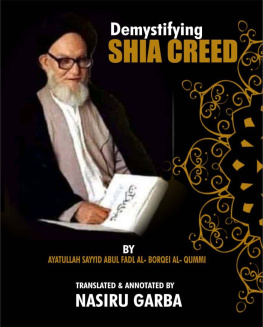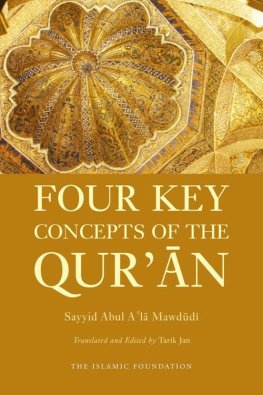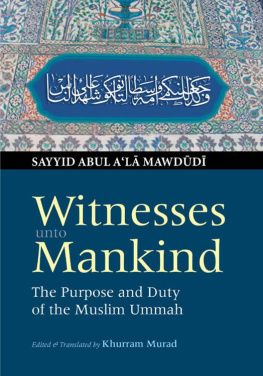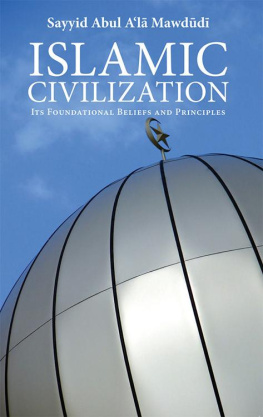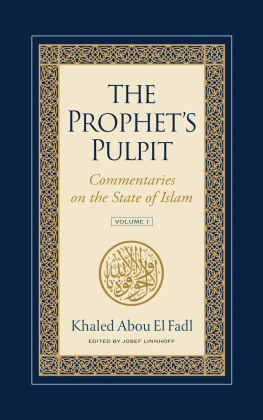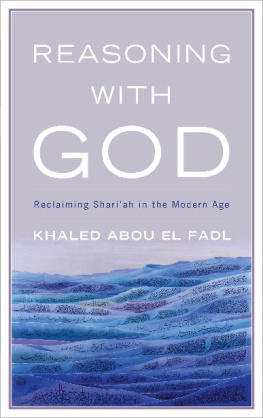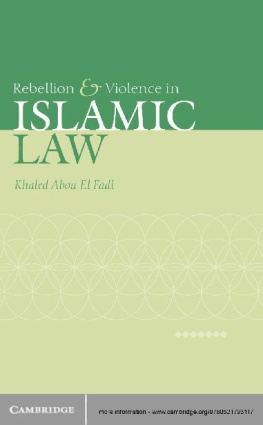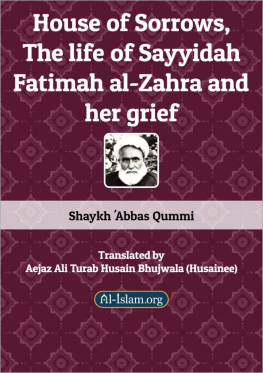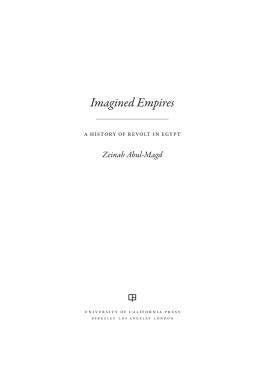AYATULLAH SAYEID ABUL-FADL BIN RIDA AL-BORQEI AL-QUMMI - DEMYSTIFYING SHIA CREED
Here you can read online AYATULLAH SAYEID ABUL-FADL BIN RIDA AL-BORQEI AL-QUMMI - DEMYSTIFYING SHIA CREED full text of the book (entire story) in english for free. Download pdf and epub, get meaning, cover and reviews about this ebook. year: 2020, genre: Religion. Description of the work, (preface) as well as reviews are available. Best literature library LitArk.com created for fans of good reading and offers a wide selection of genres:
Romance novel
Science fiction
Adventure
Detective
Science
History
Home and family
Prose
Art
Politics
Computer
Non-fiction
Religion
Business
Children
Humor
Choose a favorite category and find really read worthwhile books. Enjoy immersion in the world of imagination, feel the emotions of the characters or learn something new for yourself, make an fascinating discovery.
- Book:DEMYSTIFYING SHIA CREED
- Author:
- Genre:
- Year:2020
- Rating:3 / 5
- Favourites:Add to favourites
- Your mark:
- 60
- 1
- 2
- 3
- 4
- 5
DEMYSTIFYING SHIA CREED: summary, description and annotation
We offer to read an annotation, description, summary or preface (depends on what the author of the book "DEMYSTIFYING SHIA CREED" wrote himself). If you haven't found the necessary information about the book — write in the comments, we will try to find it.
DEMYSTIFYING SHIA CREED — read online for free the complete book (whole text) full work
Below is the text of the book, divided by pages. System saving the place of the last page read, allows you to conveniently read the book "DEMYSTIFYING SHIA CREED" online for free, without having to search again every time where you left off. Put a bookmark, and you can go to the page where you finished reading at any time.
Font size:
Interval:
Bookmark:
DEMYSTIFYING SHIA CREED
BY
AYATULLAH SAYYID ABUL FADL AL-BORQEI AL-QUMMI
Translated and Annotated By
NASIRU GARBA
In the name of Allah, the Most Beneficent, the Most Merciful. Glory is to Allah Lord of the Worlds, Whose praise should precede all writing and every speech! May the blessings of Allah rest on Muhammad, His Prophet and Apostle, on his family and companions by whose guidance error I escaped!
Before the reader is a priceless book written by Ayatullah Sayyid Abul Fadl bin Rida al- Borqei al Qummi titled: Naqd al Murajaat (a critique of The Right Path). The book; the right path, was written by Sayyid Abdul Husain Sharafuddin al Musawi, an Iraqi Shia scholar who settled in Lebanon, for the purpose of teaching the Shia that the truth to the righteousness of their creed are supported by Ahlus Sunnah texts and for the purpose of converting the ignorant, unsuspecting Ahlus Sunnah to Shia creed or at least to put doubt in their minds with their belief in Islam
Many Muslim scholars have written replies and critiques to the book written by Abdul Husain (The Right Path), each one taking a particular form of methodology. The one before the reader is different in methodology to all other critiques and above all it was written by a former Shia scholar who has reached the position of an authority (Mujtahid) in the Shia Imamiyyah sect; and none can inform you about a thing other than a learned, expert in it.
In the course of translating this book I use the Arabic version of Murajaat and not the English translated version titled The Right Path. My reasons for doing that are: There are a lot of things that the Arabic version contains which are not found in the English translated version, for example the authors introduction to his book is not included in the English version. You also find sentences and phrases being skipped in the English version and lastly I disagreed with the English translator in his translation of some paragraphs, sentences and phrases because he at times modify them.
All the references mentioned in this book have been mentioned within the paragraph under discussion and or immediately after the quotation. This is done in order to make it easy for whoever wants to refer to them to do so with ease and comfort. I also added some footnotes in order to explain some points raised by the author; these have been numbered in numerical order, I added the initial ETN (English translators note) at the end of my footnote, while the initial ATN (authors note) is added at the end of the footnote made by the author. I named this translation as Demystifying Shia Creed.
Lastly, it is very important that one take his religion seriously; he shall not follow any creed blindly or just by reading a pamphlet or a book, nor shall he follow any creed out of sentiment, partisanship, or fanaticism or trust of so and so. One shall always seek for the truth and he shall weigh any narration, story or opinion that come to him or he come across with the Quran and sound hadiths of the Messenger of Allah (s.a.w) and whatever contradict the Quran and sound hadiths shall be thrown away, discarded and pulled down. Whenever you came across a book or a creed or a sect do not just flung yourself into it without cogent, diligent research in order to ascertain the truth of their claims and also by reading books that claimed that those creeds or opinions are wrong, so that you see their proofs and their arguments, thereafter you take your course on clear understanding and knowledge. These measures became necessary because religion is a serious business for Allah created you solely to worship Him. He said: And I created not the Jinns and the humans except that they worship Me (alone) (51:56). That worship shall be made with clear, sure knowledge and understanding and not by sentiment, blind following, partisanship or group feeling. So, brothers free yourselves from partisanship, and fanaticism and you will taste the sweetness of faith and be free as Allah wants you to be. Imam Ghazali lamented that some people: Judge the truth according to its professors instead of judging its professors by the standard of the truth. But a liberal mind will take this maxim from the commander of believers, Ali bin Abi Talib (r.a) when he said: Do not seek the truth by means of men; find first the truth and then you will recognize those who follow it.
May Allah made this effort bear fruits both in this world and the Hereafter. May He guide us by His Mercy to the Straight Path.
NASIRU GARBA
nasirggusau@gmail.com
The English Translator
1st August, 2016
NIGERIA
Ayatollah Sayyid Abul Fadl bin Rida al Borqei al Qummi wrote about his biography in many of his books among which is the present book; he wrote about himself briefly under the topic titled: Journey of the author to light and the tribulations he faces. He also wrote his biography in his book titled: Khawatir, which was partly quoted by Dr. Mustafa Muhammadi in another book of the author titled: Tadad Mafatih al Jinan li Ayatul Quran (contradictions of the book; Keys to gardens to verses of the Quran), which is partly quoted here with a little addition from the web site; Gift2Shias. The author wrote:
I am from Qum, my grandparents live in it for over thirty generations and my great grandfather Musa al Barqau bin Imam Muhammad at Taqi bin Sayyiduna bin Ali bin Musa Rida (a.s), who come to Qum and his grave is presently very well known in Qum. I studied and sought knowledge in Qum under (many grand scholars such as); Ayatullah ash Sheikh Abdulkarim al Hairi al Yazdi, Ayatullah Hujjat Kamarhaye, Ayatullah al Sayyid Abul Hasan al Isfahani, Hajj Sheikh Muhammad Ali al Qummi, Mirza Muhammad al Samarai, Hajj Sheikh Abdun Nabi al Araki, Qasim al Kabir al Qummi, Ayatullah Shah Abadi and many other scholars.
He related that his father was a poor man and thus, was unable to finance his education but his mother use to work hard to pay for his school fees, while he work hard to learn under difficult conditions that includes lack of writing books, pens and text books. At the age of twelve he started learning in a religious school which refused to provide him with accommodation due to his minor age. The young Borqei was able to secure a modest accommodation from the school cleaner, who allowed him to be sleeping at the corner where he stores his brooms. The cleaner provided a broken door which Borqei placed at the corner proving what look like a room for him and he placed in it a mat that he brought from his mother. He spent days and nights in that corner which give him neither protection from the heat of the summer or cold of the winter. He spent two years in this hard condition trying to learn and sometimes working for some merchants and shop keepers to own some money in order to solve some of his daily needs for food and learning materials. At this period he didnt get any help from his parents, his extended family, or the society, but he continued to struggle and learn without those encouragements.
After he passed the school examination the school authority decided to be paying him five Riyals per month as stipend, which was later on increased to eight after he complained of its insufficiency; though these too are not enough, he managed it and contented himself. He graduated from the school and was made one of its teachers and although he has no textbooks he taught his students from his memory. He continued to teach and learn until he becomes an authority in the Shia Imamiyyah sect. some of his colleagues during the days of his study include Ayatullah Khomaini and Ayatullah Shariatmadari.
The story of his guidance was said to began when while he is giving a lesson on Tafsir (exegeses of the Quran, in his mosque in Tehran) according to the Shia Batini (esoteric) heretical Tafsir method, Mustafa Tabatabai (a grandson of Ayatullah Muhammad Tabatabai) had a discussion with him and he proved to him that the Tafsir he is giving is wrong, basing his arguments on the Arabic language and other factors. Borqei was so impressed that he acknowledged his faults and in return impressed Tabatabai, who said that until that moment he never encounter a Shia scholar who in public let himself to be corrected by a common man like himself.
Font size:
Interval:
Bookmark:
Similar books «DEMYSTIFYING SHIA CREED»
Look at similar books to DEMYSTIFYING SHIA CREED. We have selected literature similar in name and meaning in the hope of providing readers with more options to find new, interesting, not yet read works.
Discussion, reviews of the book DEMYSTIFYING SHIA CREED and just readers' own opinions. Leave your comments, write what you think about the work, its meaning or the main characters. Specify what exactly you liked and what you didn't like, and why you think so.

